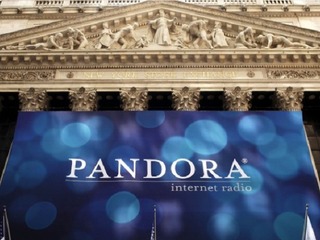
Pandora may be the largest music streaming service out there, but the company has been struggling a bit as the competition has increased and users have begun to test out other services. Pair that up with the huge amount of money it’s paying out in royalties, and you get the feeling that Pandora has seen better days.
Still, it was pretty surprising to see a report in the New York Times on Thursday that Pandora was actually considering selling itself, working with Morgan Stanley to meet with prospective buyers.
Of course this is is just a rumor, and even those sources who spoke to the times said that talks are preliminary and may not lead to a deal.
The timing of the report was interest, as it came out just before the company reported its fourth quarter earnings. The news excited investors enough to send the stock up 15 percent, ending the day with a gain of 8.45 percent, to $9.11 a share.
When the numbers were released, though, the company gave nearly all that back, dropped 5.93 percent in after hours trading.
The company posted $336.2 million in revenue, an increase of 25 percent year-to-year, beating expectations of $331.83 million. Earnings per share were $0.04 earnings per share, lower than the $0.07 that Wall Street had been anticipating.
There were two important figures in this earnings report, both of which may point to why Pandora is considering a sale.
First, for the full year 2015 the company had $1.2 billion in revenue, up from $920.8 million in 2014. However it still managed a net loss of $170 million for the year, up from a net loss of $30 million the year prior. Despite making a really nice amount of revenue, Pandora is still in the red.
The other important stat are its user numbers. For 2015, Pandora’a active listeners were 81.1 million at the end of the fourth quarter of 2015, compared to 81.5 million for the same period of the prior year, a loss of 400,000 users. So the company is losing money, and losing users.
Those two stats get to the heart of what is wrong at Pandora right now. The problem with decreasing user numbers is easy to figure out; everyone and their mother is starting a music streaming service these days, and there are only so many ears and only so many hours to listen. Apple Music has at least 15 million users, and they have to come from somewhere.
The other problem, with its inability to remain profitable, has been an issue for Pandora for its entire history, and is just a fundamental flaw with its business model, where it made the majority of its revenue in 2015, $732 million, from advertising.
The more songs that listeners access, the more ads Pandora will sell, and the more money the company will get. That obviously works in Pandora’s favor, and allows them to offer the service to its users for free. But, at the same time, the more songs that users play, the more Pandora has to pay out in royalty fees. And that is causing the company’s big headaches.
In September of last year, CEO Brian McAndrews revealed that Pandora had paid out a total of $1.5 billion in royalties, and $500 million through the first nine months of 2015 alone.
Pandora did score a victory last year when the U.S. Copyright Office ruled that a royalty payment rate agreement between Pandora and Merlin Network, a global rights agency for independent musicians, was a valid way to determine what the legal rate should ultimately be for Internet radio play. If the company does get its way, and a panel agrees to royalty rate of $0.0013 per stream, it will allow the company to become profitable.
The company does have a subscription service that it offers, which is began building out more in late 2015. However it should be noted that Spotify, one of Pandora’s biggest competitors, makes its money from a subscription service, and it too is in the red because of royalty fees.
I reached out to Pandora for a statement or comment on the report, but a company spokesperson referred me to comment made by McAndrews when he was asked about the topic during the company’s earnings call.
McAndrews was actually asked about it twice, with the questions coming back to back. First Barton Crockett from FBR Capital Markets & Co. asked about the rumor.
“We don’t want to comment on rumors. We’ll say that we’re very confident in our ability to continue to drive significant value for our shareholders by executing the strategy that you’ve heard us talk about and that’s where we’re focused on,” McAndrews responded.
He was then asked by Robert Peck, of SunTrust Robinson Humphrey, whether an M&A deal made sense at all.
“I don’t know how to answer that, this is not something we are focused on, we are focused on working as an independent company and driving our business and we’re a public company and all that that entails<‘ is how McAndrews answered.
(Image source: idownloadblog.com)

















